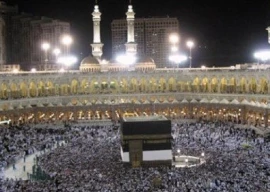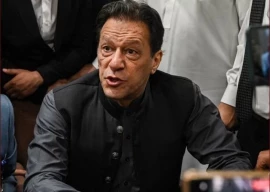
The government announced on Sunday that it would introduce the 20th amendment to the constitution, in a bid to pre-empt a likely Supreme Court decision to disqualify 26 lawmakers for having been elected through by-elections that were held without a fully constituted Election Commission of Pakistan.
The move is likely to trigger fresh concerns about the priorities of the government at a time when the country is facing severe security and economic challenges. The Pakistan Peoples Party-led coalition is bleeding political capital even as the opposition Pakistan Muslim League Nawaz is actively campaigning against what it describes as the government’s failures.
The PML-N seems to be in no mood to strike a deal with the PPP, and passing a constitutional amendment would be difficult without support from across the political spectrum, since amending the fundamental law requires a two-thirds majority in both houses of parliament.
The government’s decision was triggered by a challenge to the legality of 26 by-elections for national and provincial legislatures that have taken place since the 18th Amendment was signed by President Asif Ali Zardari into law on April 19, 2010. A constitutional petition filed by Pakistan Tehrik-e-Insaf leader Imran Khan challenged the legality of those elections on grounds that the electoral lists were flawed. During the course of the proceedings, the Supreme Court was told that four of the five positions on the election commission were empty. The Supreme Court has not yet decided on the case, but requested a list of the legislators whose elections had been called into question.
The 18th amendment calls for an election commission that consists of five commissioners, one of whom shall be chairman. The process for nomination requires the prime minister and the leader of the opposition in the National Assembly to agree on submitting three nominations “each of whom must be a retired judge” for every position to a 12-member parliamentary committee, which itself must be split equally between members of the treasury and opposition benches.
The requirement for the government and opposition to agree on even the nominations is what caused the delay in appointments to the Election Commission and both sides continue to blame each other for their supposed intransigence in agreeing on nominees.
Prime Minister Yousaf Raza Gilani submitted 12 names to Opposition Leader Chaudhry Nisar Ali Khan of the PML-N for their joint nominations for the four open positions. Nisar rejected all twelve names on grounds that all four had at one point in time in their careers as judges, taken oath under a provisional constitutional order (PCO), a quasi-legal tool used in the past by military dictators to grant their coups judicial cover.
At a press conference on Saturday, senior PPP leaders – Babar Awan, Qamar Zaman Kaira and Information Minister Firdous Ashiq Awan – repeated their allegations against the PML-N, blaming them for the delay in constituting an election commission and passing a new accountability law. They said the introduction of the 20th Amendment was the government’s response to that non-cooperation.
The government has not yet specified exactly how they plan on amending the constitution to pre-empt the Supreme Court’s challenge.
It is also unlikely that the government will be able to get a clean bill that deals just with the election commission clauses of the constitution. Many smaller parties had only agreed to support the gargantuan 18th Amendment under the condition that their pet issues would be taken up the next time there was a constitutional amendment.
Adding more issues to create an omnibus bill – particularly with lightening-rod issues such as the creation of new provinces out of Khyber-Pakhtunkhwa and Punjab – will likely reduce the chances of its passage.
While the PPP-led coalition has increased its strength in Parliament after its alliance with the Pakistan Muslim League Quaid, it is still well short of the requisite two-thirds majority needed in both houses.
Relations between the PPP and the PML-N, meanwhile, are at an all-time low, with PML-N leader traversing the country in what seems to be a very early start to the 2013 election campaign season. Meanwhile, the PPP spent much of its press conference on Sunday bashing the PML-N.
PPP leaders accused the PML-N leadership of “speaking in the language of India,” describing what has been an unusually harsh round of criticism of the military and the intelligence agencies by the PML-N.
Published in The Express Tribune, May 30th, 2011.
1732521023-0/biden-(1)1732521023-0-405x300.webp)
1732520496-0/BeFunky-collage-(86)1732520496-0-165x106.webp)
1732519472-0/lamar-(3)1732519472-0-165x106.webp)
1732519298-0/BeFunky-collage-(85)1732519298-0-165x106.webp)

1732515558-0/Copy-of-Untitled-(76)1732515558-0-270x192.webp)




1732513395-0/Copy-of-Untitled-(75)1732513395-0-270x192.webp)






COMMENTS (7)
Comments are moderated and generally will be posted if they are on-topic and not abusive.
For more information, please see our Comments FAQ